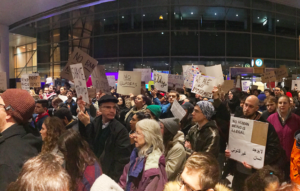 Our Muslim siblings have been under attack this week. While Muslim discrimination is not new, it’s taking more emboldened forms than ever before in the Trump era.
Our Muslim siblings have been under attack this week. While Muslim discrimination is not new, it’s taking more emboldened forms than ever before in the Trump era.
Last Friday, it came in the form of a travel ban from seven predominantly Muslim countries. On Tuesday, we learned that “extreme vetting” for some travelers from Muslim-majority countries would include prying into their social media accounts and phone records. On Wednesday, Reuters revealed that the Trump administration would change the previously named “Countering Violent Extremism” program to “Countering Islamic Extremism,” dropping any focus on other extremist groups like white supremacists.
This is a clarion call for Christian action. If we don’t act now in solidarity with our Muslim siblings, we’ve got no legitimate reason to claim we are followers of Jesus, a man executed by the state for his own supposed “religious extremism.”
We’ve seen the institutionalization of religious bigotry into public policy before. Baptists were even subject to this violence in the past: Thomas Helwys, the founder of the Baptist way of faith, died in the King’s Newgate Prison in 1616 for his perspectives on religious liberty. Roger Williams, the progenitor of Baptists in America, was banished to the wilderness in 1635 where he founded Providence — this for his “dangerous opinions” (e.g., abolitionism, fair treatment of Native people, religious liberty).

Demonstration protesting the travel ban at Logan International Airport in Boston on Jan. 28.
Our congregations and communities of faith must act swiftly to develop interreligious relationships and cultivate practices of support and solidarity for Muslim justice. Here are three things you can do in your congregations and communities to practice solidarity with your Muslim siblings:
- Hold “bystander trainings” to educate people on the “best practices” for intervening and diffusing situations of harassment toward Muslims in your community. In my community, organizations like Massachusetts Communities Action Network (a PICO organization) and Jewish Voice for Peace conduct such workshops for congregations and community groups. Find the organizations doing this work in your area and partner with them. These tools will prepare you to act in situations where you were once frozen by fear.
- Educate your congregation and community about the myriad policies and practices targeting Muslims in the U.S. (most predating Trump, but now greatly intensified). For example: prolonged detention and unconstitutional interrogations about religious and political beliefs Muslims face when traveling, the infiltration of mosques and Muslim Student Associations by informants often coerced into the role, and, of course, the “Countering Violent Extremism” (CVE) program. If you’ve never heard of this program, or don’t know the extent to which it operates, then you only know the tip of the iceberg of policy unjustly targeting Muslims.
My congregation recently partnered with neighboring Lutherans to host a Muslim Justice Teach-In led by the Muslim Justice League. We had space to seat 250 attendees; we had over 2,000 people interested in attending. The demand to know what our government is up to in the lives of our Muslim friends and neighbors is great and growing. To locate resources for hosting trainings in your city, connect with the Muslim Legal Fund of America or the Council on American-Islamic Relations (CAIR).
- Confront your state and federal politicians to oppose a Muslim registry and other intrusive practices. Many non-Muslims have suggested that if a registry existed, they would register themselves in solidarity. What I’ve been learning about this possibility, however, indicates that it is good-hearted but naïve. This “registry” won’t be a “come to your local precinct and fill out your Muslim paperwork” all call. Muslim communities are already being surveilled and mapped all over the country in sophisticated ways. The government will target the communities of people it desires to target and weed out the rest.
Instead, educate your congregation and community about practices like the terrorist watch list, CVE, and “no fly, no buy” lists. Contact your state legislators on a regular basis about why you’re concerned over these practices. Show up at demonstrations and mobilize people in your community to support Muslim civil rights and liberties in public and visible ways with media attention (clergy, you must be present and visible!). And don’t wait until more measures are instituted by the administration! Now is the time to act.
There are so many concerns that will call for mobilization and protest in the coming days — solidarity with women, with the undocumented, with LGBTQ people, and so on. But justice for Muslims facing discrimination and government targeting must become an imperative for Christians in the Trump years. It’s about religious liberty. It’s about interreligious relationality. And, ultimately, it’s about our ability to continue calling ourselves faithful followers of Jesus.
